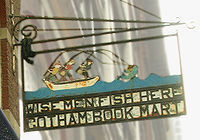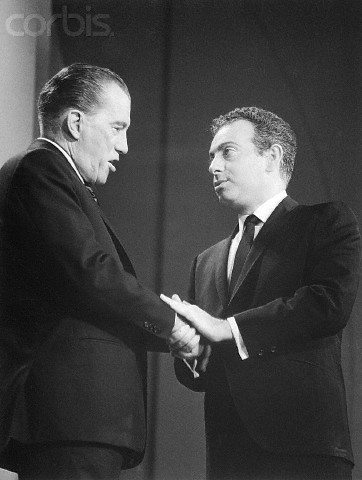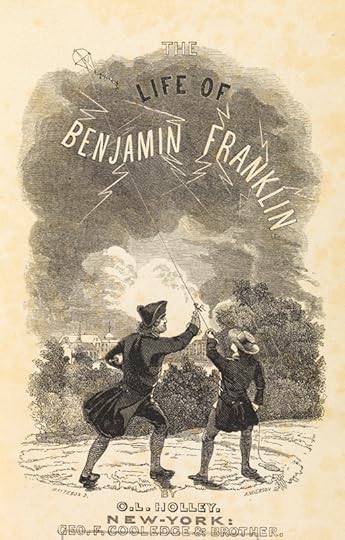Terry Teachout's Blog, page 116
December 2, 2012
TT: We'll see
What comes next? I wish I could tell you, but things are still very much up in the air as of this moment. What I can say is that the success of Satchmo to date has already outstripped my wildest dreams. No matter what may lie ahead, I'm proud and satisfied beyond measure.
To all who came to see Satchmo in Lenox, New Haven, or Philadelphia, my heartfelt thanks for helping to make it the experience of a lifetime. I hope you enjoyed it half as much as I did!
TT: Assimilated
 I've lived in New York for more than a quarter of a century, long enough to feel nostalgic whenever I see movies that were made around the time that I moved here. One such film is
Crossing Delancey
, released in 1988, in which Amy Irving plays a young woman who works at a prestigious independent bookstore that appears to have been modeled after the
Gotham Book Mart
.
I've lived in New York for more than a quarter of a century, long enough to feel nostalgic whenever I see movies that were made around the time that I moved here. One such film is
Crossing Delancey
, released in 1988, in which Amy Irving plays a young woman who works at a prestigious independent bookstore that appears to have been modeled after the
Gotham Book Mart
.As Crossing Delancey opens, New Day Books is throwing a party to celebrate its having escaped the wrecking ball. Those were the days when high-end indie bookstores were hip and ostensibly serious writers could still aspire to a certain measure of pop-culture réclame. Sic transit! The real-life Gotham Book Mart sold off its stock and closed its doors forever in 2007, just before the brick-and-mortar bookselling business imploded. As for Irving, who was (I admit it) my cinematic dream girl in 1988, she's now fifty-nine, three years my senior, and stupendously wealthy. She no longer makes movies, but I've reviewed three of her stage appearances in my Wall Street Journal drama column, all of them favorably. The last time I saw her in the flesh, I was in the company of a twenty-five-year-old friend who didn't know her name.
 I still enjoy watching Irving in her radiant youth, and I also enjoy watching Peter Riegert, a low-key, impeccably solid actor who never quite managed to become a star but did appear in two other fondly remembered films,
Animal House
and
Local Hero
. It's also fun to get a brief but already characteristic glimpse of David Hyde Pierce, who was twenty-nine and unknown when Crossing Delancey was released.
I still enjoy watching Irving in her radiant youth, and I also enjoy watching Peter Riegert, a low-key, impeccably solid actor who never quite managed to become a star but did appear in two other fondly remembered films,
Animal House
and
Local Hero
. It's also fun to get a brief but already characteristic glimpse of David Hyde Pierce, who was twenty-nine and unknown when Crossing Delancey was released.What I like best about Crossing Delancey, though, is that it reminds me of the fact that I knew next to nothing about Jews when I first saw it. The Jewishness of the characters played by Irving and Riegert in Crossing Delancey is, of course, the film's central theme, and it was by watching their uptown-downtown courtship (he owns a pickle store on the Lower East Side) that I first got wind, if only in greatly watered-down form, of some of the class-driven complexities of contemporary Jewish life.
To be sure, I'd read such now-forgotten books as Sam Levenson's Everything but Money and Allan Sherman's A Gift of Laughter, for warm, cuddly Jewish humorists were all the rage when I was a boy. Indeed, I must have read Everything but Money a dozen times, trying to imagine what it would have felt like to grow up in a large family, the way that Sam Levenson and my mother had. That their experiences were in some fundamental way dissimilar never occurred to me. So far as I knew, all large families were alike. I understood that Levenson was the son of Jewish immigrants, and that their religious beliefs were different from mine, but the rest, I assumed, was merely local color.
Nor was I well equipped to ferret out any additional differences. I had no idea, for instance, that most of the comedians I saw on television in the Sixties were Jewish, and even if I had, it probably wouldn't have mattered, the process of assimilation having by then gone a long way toward denaturing mass-market Jewish comedy. What would it have meant to me to learn that Jack Benny was Jewish? Or Alan King? I knew nothing of the briny, uncompromising tang of full-bore Jewish culture, any more than I knew what a real pickle tasted like from having eaten the bland factory-made ones sold in jars at the local supermarket.
 Only rarely did a whiff of something excitingly alien find its way to the TV set in the family room of my Missouri home. I remember being puzzled by Jackie Mason's accent when I saw him on The Ed Sullivan Show, and puzzled in a different way by Woody Allen's references to being Jewish, but my puzzlement was no more than that. I didn't yet know that it was merely the tip of a cultural iceberg that I would spend a good deal of my adult life exploring, or that I would soon feel entirely at home in the once-strange world that I saw depicted in Crossing Delancey. If you'd told me in 1988 that I'd eventually become Commentary's most frequent contributor--I've had a piece in virtually every issue since 1995--I would have laughed in your face.
Only rarely did a whiff of something excitingly alien find its way to the TV set in the family room of my Missouri home. I remember being puzzled by Jackie Mason's accent when I saw him on The Ed Sullivan Show, and puzzled in a different way by Woody Allen's references to being Jewish, but my puzzlement was no more than that. I didn't yet know that it was merely the tip of a cultural iceberg that I would spend a good deal of my adult life exploring, or that I would soon feel entirely at home in the once-strange world that I saw depicted in Crossing Delancey. If you'd told me in 1988 that I'd eventually become Commentary's most frequent contributor--I've had a piece in virtually every issue since 1995--I would have laughed in your face.New York is the greatest school in the world, a place that introduces you to things of whose existence you'd never dreamed. It can also change you beyond recognition--if you let it. I didn't. I never, ever wanted to be an ersatz New Yorker. All I wanted was to widen my horizons, to understand (among countless other things) what Isaac Bashevis Singer could possibly have meant when he remarked in the preface to Enemies, a Love Story that "I did not have the privilege of going through the Hitler holocaust." Now, up to a point, I think I do.
* * *
An interview with Sam Levenson, originally telecast in 1974 on CUNY-TV's Day at Night:
TT: Just because
(This is the latest in a series of arts-related videos that appear in this space each Monday and Wednesday.)
TT: Almanac
"She doubted if they all sensed it--they had seen the world--but even George was silent for a minute as they looked, and the scene, the smell, even the sound of the band playing a faintly recognizable movie theme, was locked forever in her, and she was at peace. Her soul knew a moment's calm, as if it had been uncrumpled and smoothed under an iron."
Stephen King, Carrie
November 29, 2012
TT: Take the money and run
* * *
Sometimes a play that doesn't quite work can be more satisfying than a well-made piece of dramatic yard goods. It isn't hard to see what's wrong with Theresa Rebeck's "Dead Accounts," the story of a manic embezzler who takes the money and runs home to his mother--yet for all its manifest flaws, Ms. Rebeck's new play is seldom predictable and never boring, and her cast, led by Norbert Leo Butz, glitters like sapphires on black velvet. If it's perfection you want, go elsewhere, but you'll miss out on an exceedingly interesting night at the theater.
 Jack, Mr. Butz's character, turns up without warning at the back door of his childhood home in suburban Cincinnati, spewing one-liners in all directions. At first it seems that a comedy is getting underway, but it soon becomes clear that bad things have either happened or are about to, and by the time Jack starts pulling stacks of bank-strapped bills out of his pockets, you've got a pretty fair idea of what's afoot. So do Lorna (Katie Holmes), Jack's unhappy sister, and Barbara (Jayne Houdyshell), his blandly censorious mother, both of whom notice with alarm that he keeps cracking jokes about having murdered his wife....
Jack, Mr. Butz's character, turns up without warning at the back door of his childhood home in suburban Cincinnati, spewing one-liners in all directions. At first it seems that a comedy is getting underway, but it soon becomes clear that bad things have either happened or are about to, and by the time Jack starts pulling stacks of bank-strapped bills out of his pockets, you've got a pretty fair idea of what's afoot. So do Lorna (Katie Holmes), Jack's unhappy sister, and Barbara (Jayne Houdyshell), his blandly censorious mother, both of whom notice with alarm that he keeps cracking jokes about having murdered his wife....While the laughs don't stop when the truth comes out, "Dead Accounts" is in fact a dead-serious comedy about what happens to people who, like Jack and Lorna, wake up one morning and realize that their lives haven't lived up to their dreams. Is it possible to change course in midstream, or are you doomed to permanent disappointment? The problem is that Ms. Rebeck, like Neil Simon before her, finds it difficult to modulate decisively into a darker key--she keeps on cracking jokes long after the situation has ceased to call for them...
I've never seen a bad production of an August Wilson play--his work has a way of bringing out the very best in its performers--but some are inevitably better than others. Ruben Santiago-Hudson, whose 2006 Signature Theatre revival of "Seven Guitars" was nothing short of magnificent, has done it again with "The Piano Lesson," Mr. Wilson's 1987 play about a Pittsburgh family whose members seek to exorcise--literally--the ghosts of the past that keep them from grappling with the challenges of the present. The staging is taut and disciplined, the acting sumptuous, and Michael Carnahan's precisely imagined two-story set would hold your attention even if the rest of the show didn't measure up....
* * *
Read the whole thing here .
"Berta, Berta," as sung by Charles S. Dutton, Carl Gordon, Tommy Hollis, and Lou Myers in the 1995 Hallmark Hall of Fame TV version of The Piano Lesson, directed by Lloyd Richards. All four men appeared in the play's original Broadway production. The song was first recorded by Alan Lomax during a 1959 visit to Mississippi's Parchman Farm Penitentiary:
TT: Almanac
William Hazlitt, "On Actors and Acting"
November 28, 2012
TT: Almanac
John Gielgud (quoted in Sheridan Morley, John Gielgud: The Authorized Biography)
TT: So you want to see a show?
Here's my list of recommended Broadway, off-Broadway, and out-of-town shows, updated weekly. In all cases, I gave these shows favorable reviews (if sometimes qualifiedly so) in The Wall Street Journal when they opened. For more information, click on the title.
BROADWAY:
• Annie (musical, G, reviewed here)
• Bring It On (musical, G, closes Dec. 30, reviewed here)
• A Christmas Story (musical, G, closes Dec. 30, reviewed here)
• Evita (musical, PG-13, reviewed here)
• The Mystery of Edwin Drood (musical, PG-13, most performances sold out last week, reviewed here)
• Once (musical, G/PG-13, most performances sold out last week, reviewed here)
• Who's Afraid of Virginia Woolf? (drama, PG-13/R, reviewed here)
OFF BROADWAY:
• Avenue Q (musical, R, adult subject matter and one show-stopping scene of puppet-on-puppet sex, reviewed here)
• The Fantasticks (musical, G, suitable for children capable of enjoying a love story, reviewed here)
• Tribes (drama, PG-13, closes Jan. 6, reviewed here)
• Vanya and Sonia and Masha and Spike (comedy, PG-13, closes Jan. 13, reviewed here)
CLOSING SOON OFF BROADWAY:
• Giant (musical, G/PG-13, closes Dec. 16, reviewed here)
TT: Once more, etc.
 The King's Man is a one-act chamber opera about the conflict between Benjamin Franklin and William, his illegitimate son, who were on opposite sides in the Revolutionary War--William, a Tory, remained loyal to the British government--and whose relationship was permanently sundered by their political differences.
The King's Man is a one-act chamber opera about the conflict between Benjamin Franklin and William, his illegitimate son, who were on opposite sides in the Revolutionary War--William, a Tory, remained loyal to the British government--and whose relationship was permanently sundered by their political differences.The King's Man will be a companion piece to Danse Russe, our second opera, which was commissioned by Philadelphia's Center City Opera Theater and premiered by them last year. The two works will make use of near-identical vocal and instrumental forces and are meant to be performed there as a double bill. Kentucky Opera , which is based in Louisville, announced today that The King's Man will be developed in the company's composer workshop program, then premiered in tandem with Danse Russe in October of 2013 as part of the company's new Contemporary Opera Series.
To learn more about The King's Man and Kentucky Opera, go here .
November 27, 2012
TT: Almanac
Harold Pinter, "Writing for the Theatre"
Terry Teachout's Blog
- Terry Teachout's profile
- 45 followers



